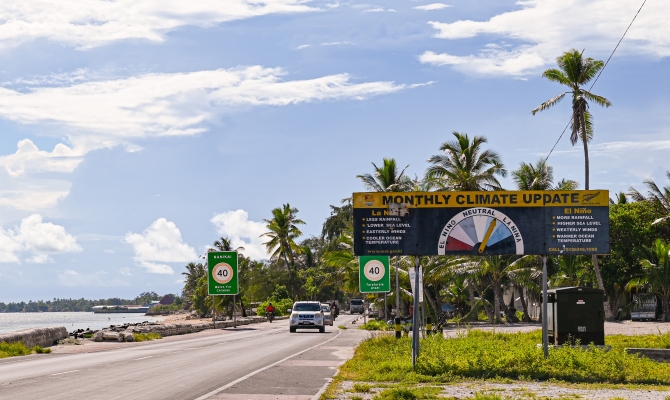
In the face of climate variability and climate change impacts, including extreme climate events in the Pacific region, the climate outlook for the next six months is crucial. Helping to build a resilient Pacific community, representatives from the Pacific National Meteorological and Hydrological Services will convene in Fiji this month for the fourteenth session of the Pacific Island Climate Outlook Forum (PICOF-14). The hybrid event will report on the past conditions of the ocean and atmosphere from November 2023 to April 2024 and provide a future climate outlook from May to October 2024.
The PICOF is a regional platform used to discuss the seasonal outlook for tropical cyclones, rainfall, temperature, and oceanic conditions for the upcoming season. The forum also serves to build capacity and enable knowledge exchange between National Meteorological and Hydrological Services (NHMS), regional technical partners and other key stakeholders.
“Improved understanding of the past and current status of the climate and ocean conditions, including the future climate outlook are key outcomes for this forum. It cannot be stressed enough that information from PICOF-14 will be crucial in improving national climate and ocean information to meet the needs of primary stakeholders and community needs in preparations for the coming months” said SPREP Director of Climate Change Resilience, Ms Tagaloa Cooper.
A La Niña event, a phenomenon in which stronger trade winds enhance warm pool in the western Pacific, is predicted for the second half of 2024. With such outlook, countries in the central Pacific are expected to experience below normal rainfall and countries in the Southwest Pacific to see higher than average rainfall. PICOF-14 will also provide an avenue for NHMSs to strengthen their national responses and preparedness for the upcoming La Niña event.
For our Pacific Island people, understanding what lies ahead when it comes to weather and climate is a matter of survival.
To strengthen our preparation, this PICOF will bring regional and national weather and climate technical experts to be part of the discussion. This will allow all NMHSs’ to understand and translate regional climate outlooks developed during this forum to national climate outlooks and share the information to national users and climate sensitive sectors so they can better plan and prepare across the Pacific Islands. The ultimate goal is to minimise the risks of extreme climate events and take advantage of opportunities of our future climate.
The PICOF is based on the World Meteorological Organisation’s Regional Climate Outlook Forum concept and is co-organised by the Secretariat of the Pacific Regional Environment Programme (SPREP) and WMO.
Technical support is provided by the Australian Bureau of Meteorology, National Institute of Water and Atmospheric Research, APEC Climate Centre, Meteo-France, US National Oceanic and Atmospheric Administration, Pacific Community, Secretariat of the Pacific Regional Environment Programme and the University of Hawaii as members of the Pacific Regional Climate Network Node for Long-Range Forecasting in partnership with the Pacific Islands Climate Services Panel.
PICOFs are typically held twice a year, October and April with the current session focusing on the seasonal climate outlook for May to October 2024.
PICOF-14 will be held on 16 April 2024 at the Shangri-La Hotel, Yanuca Island, Fiji. PICOF sessions are co-sponsored by the European Union through the Intra-ACP Climate Services and Related Applications (ClimSA) project, World Meteorological Organisation through the Climate Risk Early Warning Systems (CREWS) Pacific SIDS Project, funded by the CREWS Initiative and Environment and Climate Change Canada (ECCC). Australian Bureau of Meteorology (BOM), National Institute of Water and Atmospheric Research (NIWA), Secretariat of the Pacific Regional Environment Programme (SPREP) and Pacific Community (SPC) support is largely provided via the Australian and New Zealand Aid Funded Climate and Oceans Support Program in the Pacific (COSPPac).
For more information, please contact the Pacific Meteorological Desk Partnership at [email protected] or your local National Meteorological and Hydrological Service.